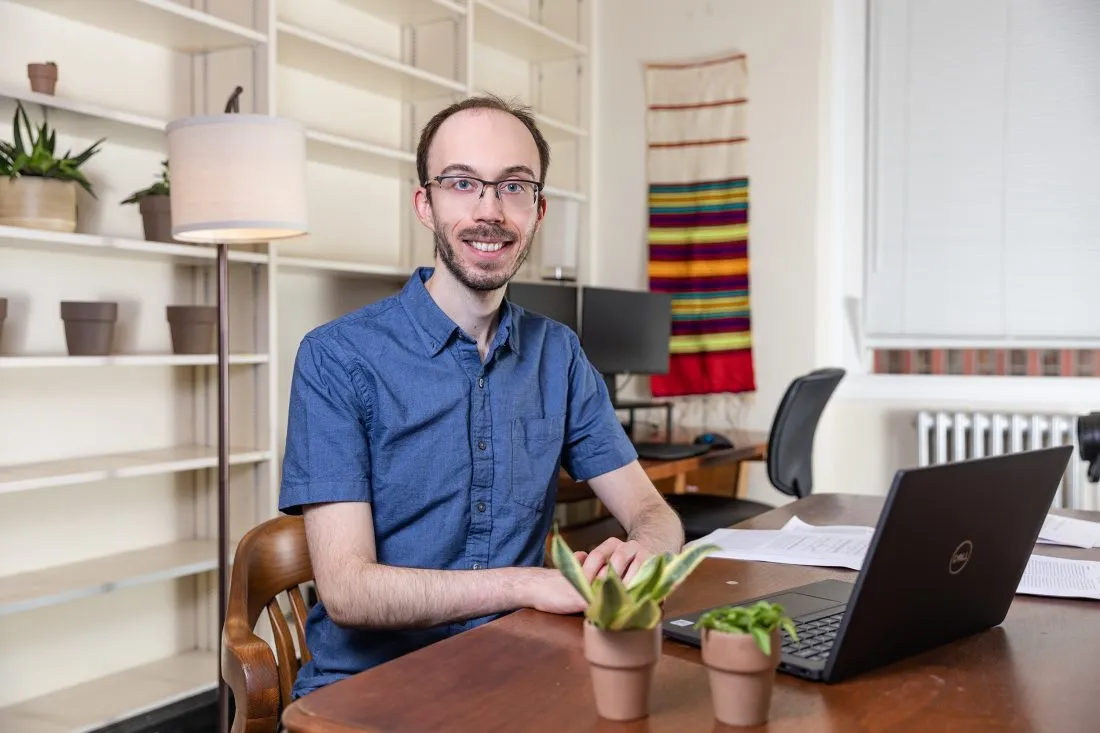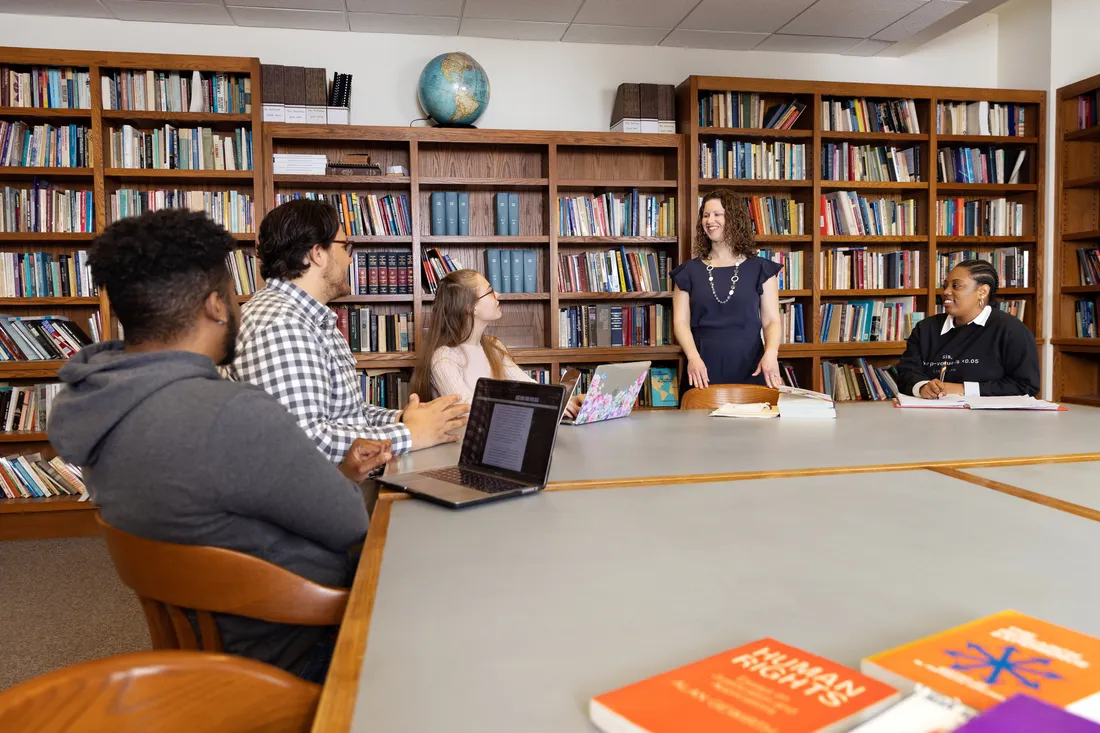
Professor Ethan Coffel uses spatial analysis, climate science and statistical crop yield modeling to understand the relationship between crops and the climate.
As New York state farmers brace for another growing season, they are likely to feel the heat of global warming, says Syracuse University professor Ethan Coffel.
Coffel is principal investigator on a three-year National Science Foundation (NSF) grant project exploring the link between climate and agricultural change—a process known as the crop-climate feedback cycle. He says that while staple food crops may see sharp declines in yields from global warming, agricultural adaptations, like moving crops to cooler latitudes, may reduce some of the damage. “Precipitation and temperature have huge impacts on crop growth,” he explains. “Some places have much lower yields because they’re too dry, wet or hot.”
I want to develop adaptation strategies to increase the climate resilience of food production.
Ethan Coffel
Coffel studies how crop growth affects local climate, which in turn impacts crop production. “Research shows that crop growth actually cools the local climate in some of the world’s most agriculturally productive regions,” says Coffel, an assistant professor of geography and the environment in both the Maxwell School of Citizenship and Public Affairs and the College of Arts and Sciences . “This mitigates the effects of hot temperatures and boosts crop yields.”
By observing different crop-climate feedback cycles, he can assess the future risk of climate-driven food insecurity as well as the potential for economic losses in agricultural regions. “I want to develop adaptation strategies to increase the climate resilience of food production,” says Coffel, who earned a Ph.D. in atmospheric science from Columbia University.
Forming Transparent Answers

“Research shows that crop growth cools the local climate in some of the world’s most agriculturally productive regions,” says Coffel.
Coffel and his co-principal investigator, Justin Mankin, are focusing on the upper midwestern United States, eastern Europe, northern China, and southern Africa and Asia. “We’re especially interested in the central U.S.—Iowa and Illinois as well as parts of Indiana, Wisconsin, Minnesota and Nebraska—because it has not seen significant increases in maximum temperatures,” says Coffel, who arrived at Syracuse last fall after a postdoctoral fellowship at Dartmouth College. “The rest of the world, however, has gotten hotter over the past 40 years.”
He is excited to reunite with Mankin, his former postdoctoral advisor. Earlier this year, they co-authored articles about zero-carbon power in Environmental Research Letters and Carbon Brief . “Ethan has a nose for creative and important research questions. His technical skills and assiduous research practices form answers that are useful and transparent,” says Mankin, assistant professor of geography at Dartmouth.
It’s getting to the point where Syracuse’s climate is similar to what it used to be in southern New York or New Jersey.
Ethan Coffel
Their research hinges on large-scale evaporation. “We know that water vapor transpired by plants cools the air around them,” Mankin continues. “If crops are productive enough, their transpiration can reduce the number of extremely hot days that they experience.” In fact, he explains, the vast acreage of corn and soybeans in the central United States cools the climate enough to create favorable weather conditions—and contribute to bountiful harvests.
“There is a point at which global warming increases enough, even in the Upper Midwest, so that crops can no longer shed heat to keep apace,” Mankin counters. “When this happens, we might expect a reduction in crop yields and an increase in extreme heat.”
For this reason, both researchers analyze food security and crop productivity inequities worldwide, especially where crops do not produce as much as they theoretically could. “Spatial analysis, climate science and statistical crop yield modeling help us understand the complex relationship between crops and the climate,” says Coffel, who also studied computer science at Northwestern University.
Making Eco-Friendly Choices
Scientists agree that the Industrial Revolution kickstarted modern global warming. Since the 1830s, carbon-rich deposits of coal, oil and natural gas have been burned for heat energy, pumping a staggering amount of the greenhouse gas carbon dioxide into the environment. One study suggests that 15% percent of today’s carbon dioxide will remain in the environment for 10,000 years.
The effects of climate change on agriculture include drought, severe weather, livestock shortages and a growing number of pests, to name a few. These effects are governed by processes called climate feedback loops: a positive feedback loop strengthens an environmental effect; a negative one weakens it.
“Climate change causes the water cycle to speed up, creating uneven evaporation and precipitation rates around the world,” says Coffel, citing an example of a positive feedback loop. “Water vapor has a way of magnifying greenhouse gases in the environment.”
In Coffel’s home state of New York, the annual average temperature has risen more than two and a half degrees since 1970. This uptick has prompted drought, flooding, and unseasonably hot and cold temperatures, potentially threatening one of the nation’s most prodigious agricultural centers. “It’s getting to the point where Syracuse’s climate is similar to what it used to be in southern New York or New Jersey,” says Coffel, whose project provides student research and local public outreach opportunities. “The world’s climate zones are moving toward the poles.”
To stem the tide of global warming, he encourages people to make small, easy lifestyle changes—from shifting toward plant-based diets to swapping cars for bikes to taking fewer flights. Coffel is particularly keen on “pieces of infrastructure,” like electric cars and energy-efficient home heating systems, that are eco-friendly. “Otherwise, that favorite gas-guzzler of yours will be harming the environment for decades to come,” he warns. “Choices we make today will affect our children and our children’s children.”


